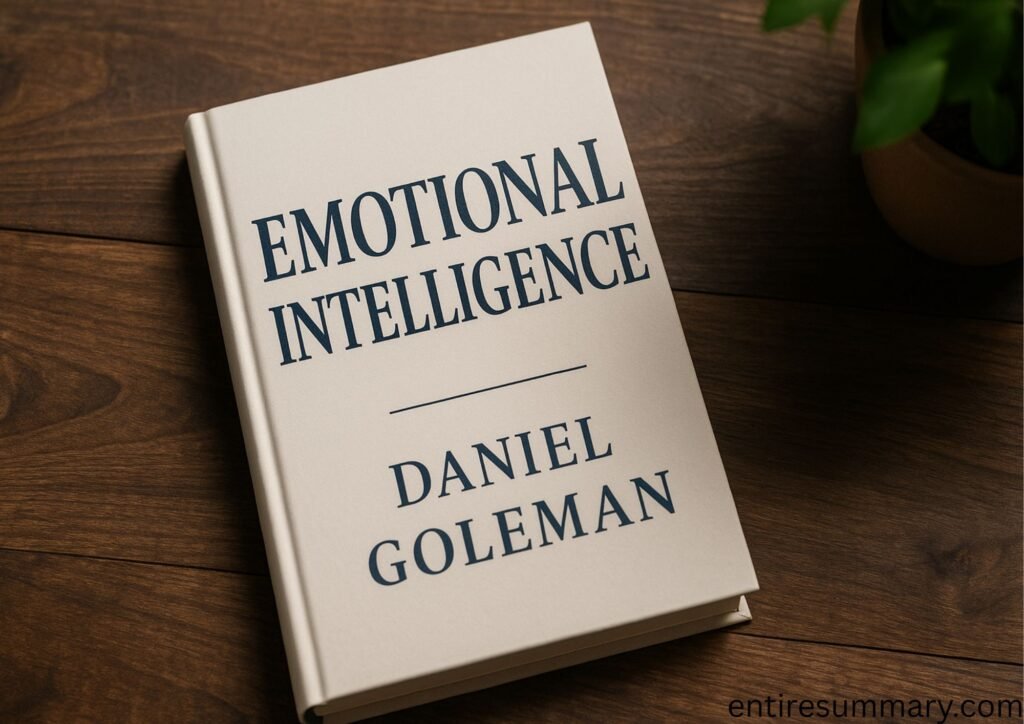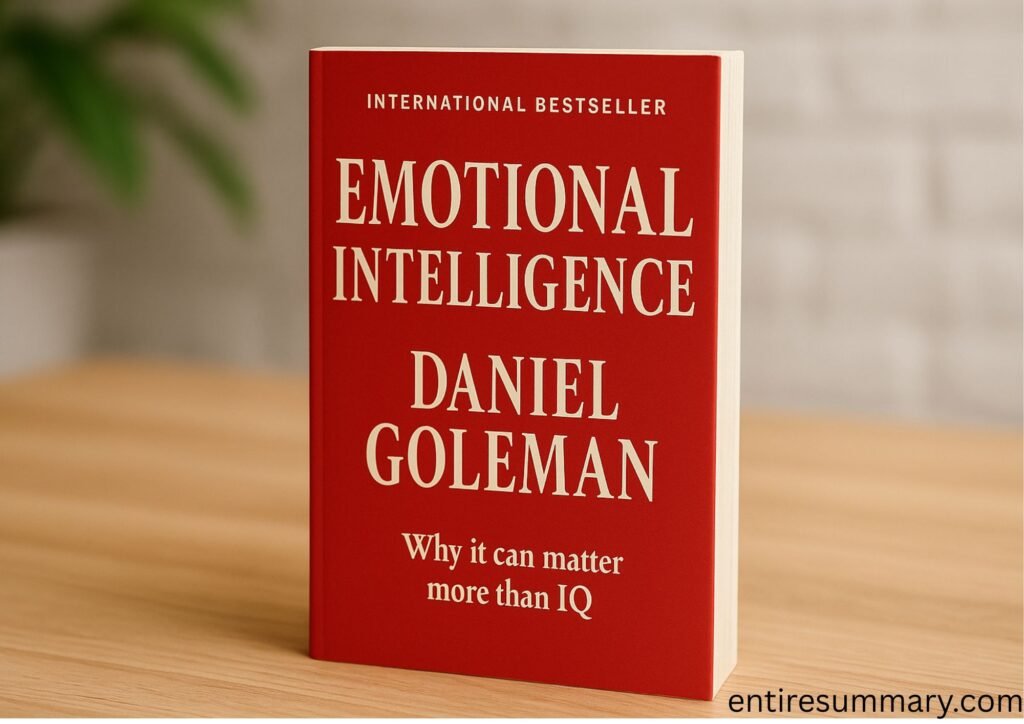Ever wonder why some people just seem to ‘get it’ while others struggle, even with a high IQ? This question is at the heart of Daniel Goleman’s revolutionary book, ‘Emotional Intelligence: Why It Can Matter More Than IQ.’ This book, published in 1995, challenged the long-held belief that intelligence, as measured by IQ, is the primary predictor of success. Goleman argues that our ability to understand and manage emotions, both our own and those of others, is a more crucial factor in determining how well we do in life.
The Foundations of Emotional Intelligence
Goleman’s work didn’t invent the term emotional intelligence, but it brought the concept into the mainstream and solidified its framework. The book is structured around five key domains that make up emotional intelligence, and the first half is all about the first three: knowing your emotions, managing them, and using them to motivate yourself.
The first core component is Self-Awareness. This is the foundation of emotional intelligence. This refers to the skill of recognizing and understanding your own emotions, moods, and impulses, and how they influence the people around you. Goleman emphasizes that this is more than just being aware of your feelings; it’s about being able to recognize what you’re feeling as you feel it. People who are self-aware are honest with themselves and have a good grasp of their strengths and weaknesses. They’re also more likely to have a sense of humor about their own shortcomings and are open to feedback.
Also read: /atomic-habits/
The second component is Self-Regulation. This refers to the skill of managing or re-routing disruptive emotions and urges. It’s about thinking before you act and not letting your emotions get the best of you. Goleman contrasts this with the “emotional hijacking” of the amygdala, where our brain’s emotional center takes over, leading to impulsive and often regrettable actions. Those who are good at controlling themselves are dependable, flexible, and capable of dealing with new situations. They can stay calm under pressure and are less likely to get into emotional conflicts.
The third component is Motivation. This isn’t just about being driven by external rewards like money or status. Goleman talks about a deeper, intrinsic motivation. This refers to a drive to work that comes from internal reasons rather than external ones. Emotionally intelligent people are driven by a need to achieve for the sake of achieving. They are committed to their goals and can stay optimistic even when faced with setbacks. They love a challenge and are constantly looking for ways to improve.
Goleman explains these ideas using a compelling combination of scientific findings and practical examples from the real world. He dives into the biology of the brain, explaining how the amygdala and the neocortex interact to produce our emotional responses. He provides powerful anecdotes about individuals who, despite average IQs, achieved great success through their self-awareness and self-management. He also gives tragic examples of brilliant people whose lives were derailed by a lack of emotional control.
The Social Side of Emotional Intelligence
The second half of the book moves from the personal to the interpersonal, focusing on how emotional intelligence impacts our relationships and professional lives. This is where Goleman introduces the final two components of the framework: empathy and social skills.
The fourth component is Empathy. This is the ability to understand and comprehend the emotional condition of other people. It’s about actively listening to others and being able to empathize with their perspective. Goleman points out that this is more than just feeling sorry for someone. It’s about sensing their feelings, concerns, and perspectives. It’s a crucial skill for leaders, salespeople, and anyone who works with people. Empathetic people are good at listening, they can pick up on social cues, and they can anticipate the needs of others. They are also less inclined to stereotype others and are more receptive to different viewpoints.
The fifth and final component is Social Skills. TThis represents the peak or ultimate result of the other four components. It’s about managing relationships and building networks. People with strong social skills are persuasive, can lead and inspire others, and are excellent at communication. They can build rapport quickly and find common ground with a wide range of people. They’re also great at managing conflict and facilitating teamwork. Goleman shows us that social skills are not just about being outgoing; they are about being effective in your interactions with others.

Goleman provides powerful examples from the corporate world, showing how companies led by emotionally intelligent people create a more positive and productive work environment. He highlights how empathy and social skills are essential for successful leadership and how they can be taught and developed. He also delves into the emotional intelligence of children and how parents and teachers can help them develop these crucial skills from a young age.
Key Takeaways
- Emotional Intelligence Is as Important as IQ: The book’s central message is that while IQ might get you in the door, EQ is what keeps you there and helps you thrive.
- Emotions Aren’t Just Feelings; They’re Information: Our emotions are valuable data that can inform our decisions and actions if we learn how to understand and manage them.
- Emotional Intelligence Can Be Learned and Developed: Goleman argues that unlike IQ, which is relatively fixed, emotional intelligence is a set of skills that can be improved over time with practice and self-awareness.
- Relationships are the Key to Success: The public-facing components of emotional intelligence—empathy and social skills—are what truly unlock our potential for collaboration, leadership, and a fulfilling life.
FAQs
1. What is the core definition of Emotional Intelligence?
Emotional Intelligence, or EQ, is the ability to understand and manage your own emotions, and to recognize and influence the emotions of those around you.
2. Is emotional intelligence a real, scientific concept?
Yes. Goleman’s work is based on decades of research in psychology and neuroscience. The book provides extensive evidence and studies to back up its claims.
3. What is “emotional hijacking” and how does it relate to emotional intelligence?
Emotional hijacking happens when your emotions, driven by the amygdala, override your logical thoughts, which are processed by the neocortex. This leads to an immediate, often irrational, emotional reaction. Emotional intelligence, particularly self-regulation, helps us prevent or recover from these hijackings.
4. Can you really improve your emotional intelligence?
According to Goleman, yes. Unlike IQ, which is more fixed, emotional intelligence is a set of skills that can be developed through conscious effort, practice, and a commitment to self-awareness and self-improvement.
5. How does a lack of emotional intelligence affect a person’s life?
A person with low emotional intelligence may struggle with relationships, have difficulty managing stress, be prone to impulsive behavior, and find it challenging to work effectively with others.
6. Does Goleman discuss the role of emotional intelligence in parenting?
Yes, Goleman dedicates a significant part of the book to how parents can help their children develop emotional intelligence from a young age by teaching them to understand and label their emotions.
7. Is this book still relevant today?
In today’s complex and interconnected world, the capacity to communicate, cooperate, and show empathy as a leader is crucial. The principles in the book are timeless and have become even more valued in modern workplaces.

Final Thoughts
‘Emotional Intelligence’ is a book that changed the way I think about success and human potential. It’s a powerful reminder that our feelings are not a weakness but a source of strength if we learn to harness them. This book provides a clear, compelling argument for why our ability to connect with ourselves and others is the ultimate key to a happy and effective life. I highly recommend it to anyone who wants to better understand themselves and the people around them. If you found this interesting, you might also like ‘The Power of Habit’ by Charles Duhigg, which explores the science of how habits work.

